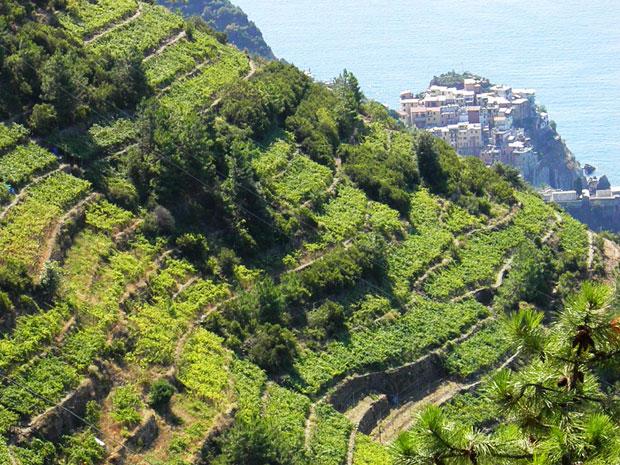 Over the next five years, as we documented the challenges of the Cinque Terre for the film, we learned this to be the essence of not only winemaking, but life in general in the Cinque Terre. A respect for the past, an understanding of the present, and a dedication to the future has held these villages together for nearly two thousand years, from their earliest beginnings to the modern-day throngs of tourists, nearly four million in number, who arrive every year to the Cinque Terre hoping to glimpse what may be the last remnant of the quaint, seaside fishing and agricultural life of Italy.
For a wine limited to such a small, remote region, the Sciacchetrà has endured its own unique past and present, and poses an interesting conundrum for its future. How do you continue a tradition that has its roots in the precious heritage of a local culture, when in modern day it poses so many economic challenges? Krista and I have heard at least a dozen legends about the Sciacchetrà, all of them fascinating, including the account of ships transporting cases of the wine down to Rome in the sixteenth century to deliver to Pope Paul III himself. The well-established history and value of the wine has never been in question; Boccaccio himself is said to have written of its quality.
So why isn’t the Sciacchetrà in every wine shop in America, or anywhere else outside of Italy, right next to the Pinot Grigio and Chardonnay?
The answer is rooted in modern day economics, which challenges the small wine growers of the Cinque Terre and other rural parts of Italy and Europe.
Over the next five years, as we documented the challenges of the Cinque Terre for the film, we learned this to be the essence of not only winemaking, but life in general in the Cinque Terre. A respect for the past, an understanding of the present, and a dedication to the future has held these villages together for nearly two thousand years, from their earliest beginnings to the modern-day throngs of tourists, nearly four million in number, who arrive every year to the Cinque Terre hoping to glimpse what may be the last remnant of the quaint, seaside fishing and agricultural life of Italy.
For a wine limited to such a small, remote region, the Sciacchetrà has endured its own unique past and present, and poses an interesting conundrum for its future. How do you continue a tradition that has its roots in the precious heritage of a local culture, when in modern day it poses so many economic challenges? Krista and I have heard at least a dozen legends about the Sciacchetrà, all of them fascinating, including the account of ships transporting cases of the wine down to Rome in the sixteenth century to deliver to Pope Paul III himself. The well-established history and value of the wine has never been in question; Boccaccio himself is said to have written of its quality.
So why isn’t the Sciacchetrà in every wine shop in America, or anywhere else outside of Italy, right next to the Pinot Grigio and Chardonnay?
The answer is rooted in modern day economics, which challenges the small wine growers of the Cinque Terre and other rural parts of Italy and Europe. In an area where all grapes must be picked and transported by hand, carried down the steepest of dangerous terrain known for falling rocks, and where the local population barely exceeds five thousand, the bulk of it over the age of eighty, how on earth can production be brought to a level to compete with the Mondavis of the world?
It can’t be. And that’s the beauty of a wine like the Sciacchetrà. In an area where it is impossible to mechanize the vendemmia, annual production will only reach a potential based on how much manpower is available, and there’s not a lot in the Cinque Terre. At least not right now, but greater appreciation for this wine and awareness of its quality can change that.
“There are fewer than twenty producers of Sciacchetrà currently,” we were told upon that first visit in 2008. One eighty-year-old winemaker told us stories about carrying massive baskets of grapes up and down the terraces as a child. He laughed, remarking, “What a life! Incredible! The new generation today… no one would do it!”
Today, he’s delighted to be somewhat wrong. While the production of Sciacchetrà remains low, and the struggle to maintain the tradition continues, there are young winemakers who have in recent years developed a passion for the ancient winemaking tradition they observed as children.
In an area where all grapes must be picked and transported by hand, carried down the steepest of dangerous terrain known for falling rocks, and where the local population barely exceeds five thousand, the bulk of it over the age of eighty, how on earth can production be brought to a level to compete with the Mondavis of the world?
It can’t be. And that’s the beauty of a wine like the Sciacchetrà. In an area where it is impossible to mechanize the vendemmia, annual production will only reach a potential based on how much manpower is available, and there’s not a lot in the Cinque Terre. At least not right now, but greater appreciation for this wine and awareness of its quality can change that.
“There are fewer than twenty producers of Sciacchetrà currently,” we were told upon that first visit in 2008. One eighty-year-old winemaker told us stories about carrying massive baskets of grapes up and down the terraces as a child. He laughed, remarking, “What a life! Incredible! The new generation today… no one would do it!”
Today, he’s delighted to be somewhat wrong. While the production of Sciacchetrà remains low, and the struggle to maintain the tradition continues, there are young winemakers who have in recent years developed a passion for the ancient winemaking tradition they observed as children.  Winemakers like Heydi Bonanini, featured in the documentary film "Vendemmia", have taken that passion and respect for tradition and they are starting to build a new empire, one that embraces the touristic economy of the Cinque Terre villages, but maintains its traditions and upholds the ability for the tourists to experience it when they arrive.
While the best way to enjoy a glass of Sciacchetrà is still while sitting down at the harbor of one of the five villages, after an extraordinary meal of Ligurian pasta al pesto made with the basil growing in the foothills behind you, there are now opportunities for Americans to acquire the rare vintage here in the United States. In fact, Heydi Bonanini’s wine is now available at E&R Wines in Portland, Oregon, one of the few (if not only) locations Krista and I are currently aware of in the United States to market the wine stateside.
Heydi closes our film with the observation that his dream is to “bring the Cinque Terre to the limelight for its products, as it has been for a thousand years. To speak of the Cinque Terre not only as a fine tourist place, but for the quality of the wine products, is my goal.” It’s a passionate plea to the audience, but conveys an essential truth: embracing the wine is tantamount to embracing a thousand years of tradition and the continued struggle to maintain the heritage of these precious Italian villages. As Italian Sommelier Nicola Biscardo also tells the audience at the film’s closing, the Sciacchetrà is nothing less than “…heritage in a glass. And that’s why to me, it’s so special.”
For more information on the Sciacchetrà, watch Nicola Biscardo walk you through a tasting of this extraordinary wine:
Winemakers like Heydi Bonanini, featured in the documentary film "Vendemmia", have taken that passion and respect for tradition and they are starting to build a new empire, one that embraces the touristic economy of the Cinque Terre villages, but maintains its traditions and upholds the ability for the tourists to experience it when they arrive.
While the best way to enjoy a glass of Sciacchetrà is still while sitting down at the harbor of one of the five villages, after an extraordinary meal of Ligurian pasta al pesto made with the basil growing in the foothills behind you, there are now opportunities for Americans to acquire the rare vintage here in the United States. In fact, Heydi Bonanini’s wine is now available at E&R Wines in Portland, Oregon, one of the few (if not only) locations Krista and I are currently aware of in the United States to market the wine stateside.
Heydi closes our film with the observation that his dream is to “bring the Cinque Terre to the limelight for its products, as it has been for a thousand years. To speak of the Cinque Terre not only as a fine tourist place, but for the quality of the wine products, is my goal.” It’s a passionate plea to the audience, but conveys an essential truth: embracing the wine is tantamount to embracing a thousand years of tradition and the continued struggle to maintain the heritage of these precious Italian villages. As Italian Sommelier Nicola Biscardo also tells the audience at the film’s closing, the Sciacchetrà is nothing less than “…heritage in a glass. And that’s why to me, it’s so special.”
For more information on the Sciacchetrà, watch Nicola Biscardo walk you through a tasting of this extraordinary wine:
Sharon Boeckle Director "Vendemmia - A Documentary Film"








